

Rajesh Kumar Singh -
India’s inflation cooled to its lowest in at least five years in January as food prices fell following the government’s cash clampdown, but emerging price pressures mean the Reserve Bank of India (RBI) will probably keep interest rates on hold.
Consumer prices rose by an annual 3.17 per cent last month — their slowest pace since January 2012 when the government launched the current index series. Economists surveyed by Reuters had expected prices to rise by 3.22 per cent from a year earlier, compared with December’s 3.41 per cent increase.
However, core inflation, which excludes volatile food and fuel prices, accelerated to around 5.1 per cent last month from 4.9 per cent in December, government data showed.
“The RBI will continue to hold, the RBI is seeing upside risks to inflation and one data point is not going to change their view dramatically,” said Varun Khandelwal, managing director at Bullero Capital.
Historically, India has paid more attention to wholesale prices than consumer ones, but the RBI now tracks retail inflation for setting its interest rates.
Annual retail food inflation eased to 0.53 per cent last month from 1.37 per cent in December, helped by lower prices for vegetables and pulses.
Headline inflation has been under 4 per cent since November, well below the RBI’s 5 per cent target for March and medium-term target of 4 per cent.
Low inflation led many to believe the central bank would cut the repo rate last week. But a pick-up in global crude prices, a volatile foreign exchange market, and relatively high domestic non-food and non-fuel inflation have fuelled concerns among RBI officials.
Last week, the RBI shocked investors by holding at 6.25 per cent and shifting its monetary policy stance to “neutral” from “accommodative”. The shift came as Asia’s third-largest economy was still limping back to health after Prime Minister Narendra Modi’s November 8 decision to outlaw Rs 500 and Rs 1,000 old banknotes wiped out 86 per cent of the currency in circulation overnight. — Reuters
Oman Observer is now on the WhatsApp channel. Click here



